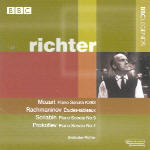Sviatoslav Richter’s June 19, 1966 Aldeburgh Festival recital first “officially” appeared on a limited edition BBC release (WMCU 0013-2). It also included Mozart’s piano duet Sonata K. 521 with Benjamin Britten sitting in, issued in 2000 by Decca (type Sviatoslav Richter in the Review Search to read my comments). While the solo contents have figured on numerous independent labels, BBC Legends’ first-generation transfer from the original master tape yields improved presence and definition in comparison to the fine version on Music and Arts–but not to any revelatory degree. Furthermore, BBC’s slightly distant microphone placement gives a good idea of how an audience member might perceive Richter’s luminescent tone and powers of projection.
The suavely spun Mozart G major sonata K. 283 seems comparatively aloof next to Richter’s January 1966 Salzburg recording (Philips), with its more animated first movement and greater variety in articulation. I also perceive slightly lessened drive and detail in the two Rachmaninov Etudes-Tableaux compared to the 1966 versions on the bonus disc included with Philips’ Richter Edition, although the fingerwork is more nimble and incisive than in Richter’s 1983 studio efforts (Olympia). Perhaps my perceptions have to do with Philips’ closer, more detailed engineering. Yet Richter’s loving, meditative way with four selections from Tchaikovsky’s The Seasons prove just as effective here as they do in the aforementioned 1983 sessions.
Scriabin’s Ninth Sonata’s disquieting trills and murky harmonic terrain actually benefit from the sonic haze, as do Richter’s subtle nuances and carefully orchestrated climaxes, so different in effect from Horowitz’s more spacious, overtly theatrical 1965 Carnegie Hall recording. To many listeners, the Richter/Prokofiev alliance was a pairing equally synonymous to Gieseking/Debussy, Schnabel/Beethoven, or Gould/Bach, and justifiably so. His 1989 Royal Festival Hall Fourth Sonata (issued as part of the Philips Richter Edition) stands out for both Richter’s sustained symphonic breadth in the slow movement and the power the 74-year-old pianist could still unleash in the taxing, extroverted Finale. These qualities characterize the present performance, but with the added sparkle and suppleness of a pianist 23 years younger. All told, a worthy addition to BBC Legends’ ongoing Richter releases.
































